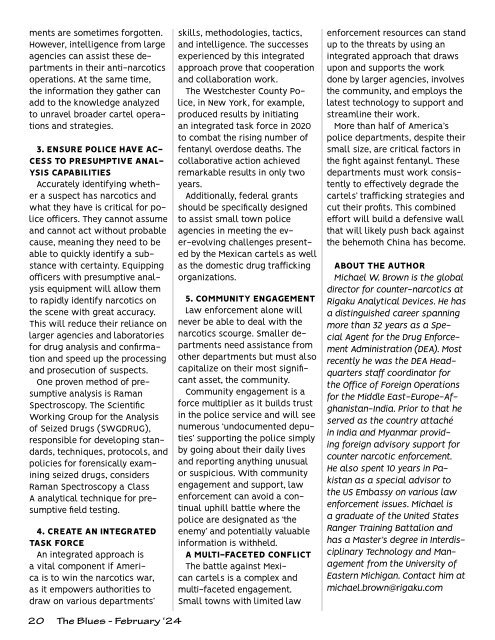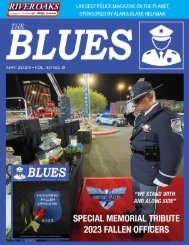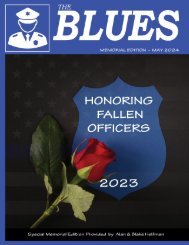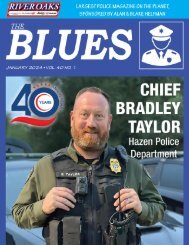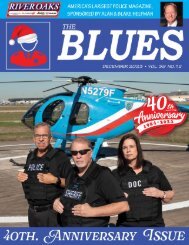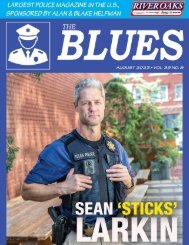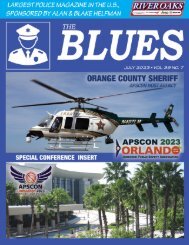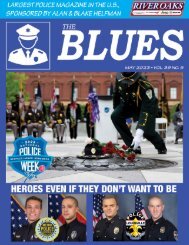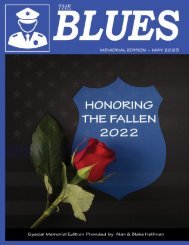Feb 2024. Blues Vol 40 No. 2
Feb 2024. Blues Vol 40 No. 2 FEATURES 66 RICK FERNANDEZ & COP STOP 90 SPECIAL ELECTION INSERT HARRIS & GALVESTON COUNTY DEPARTMENTS PUBLISHER’S THOUGHTS EDITOR REX EVANS THOUGHTS GUEST COMMENTARY - REX EVANS GUEST COMMENTARY - DANIEL CARR GUEST COMMENTARY - MICHAEL BROWN GUEST COMMENTARY - ART WOOLERY GUEST COMMENTARY - DANIEL CARR NEWS AROUND THE US SURVIVING THE STREETS SHOT SHOW RECAP ISD PD JOB LISTINGS CALENDAR OF EVENTS REMEMBERING OUR FALLEN HEROES WAR STORIES AFTERMATH HEALING OUR HEROES DARYL’S DELIBERATIONS BLUE MENTAL HEALTH DR. LIGHT BULB AWARD ADS BACK IN THE DAY PARTING SHOTS BUYERS GUIDE NOW HIRING BACK PAGE
Feb 2024. Blues Vol 40 No. 2
FEATURES
66 RICK FERNANDEZ & COP STOP
90 SPECIAL ELECTION INSERT
HARRIS & GALVESTON COUNTY
DEPARTMENTS
PUBLISHER’S THOUGHTS
EDITOR REX EVANS THOUGHTS
GUEST COMMENTARY - REX EVANS
GUEST COMMENTARY - DANIEL CARR
GUEST COMMENTARY - MICHAEL BROWN
GUEST COMMENTARY - ART WOOLERY
GUEST COMMENTARY - DANIEL CARR
NEWS AROUND THE US
SURVIVING THE STREETS
SHOT SHOW RECAP
ISD PD JOB LISTINGS
CALENDAR OF EVENTS
REMEMBERING OUR FALLEN HEROES
WAR STORIES
AFTERMATH
HEALING OUR HEROES
DARYL’S DELIBERATIONS
BLUE MENTAL HEALTH DR.
LIGHT BULB AWARD
ADS BACK IN THE DAY
PARTING SHOTS
BUYERS GUIDE
NOW HIRING
BACK PAGE
You also want an ePaper? Increase the reach of your titles
YUMPU automatically turns print PDFs into web optimized ePapers that Google loves.
ments are sometimes forgotten.<br />
However, intelligence from large<br />
agencies can assist these departments<br />
in their anti-narcotics<br />
operations. At the same time,<br />
the information they gather can<br />
add to the knowledge analyzed<br />
to unravel broader cartel operations<br />
and strategies.<br />
3. ENSURE POLICE HAVE AC-<br />
CESS TO PRESUMPTIVE ANAL-<br />
YSIS CAPABILITIES<br />
Accurately identifying whether<br />
a suspect has narcotics and<br />
what they have is critical for police<br />
officers. They cannot assume<br />
and cannot act without probable<br />
cause, meaning they need to be<br />
able to quickly identify a substance<br />
with certainty. Equipping<br />
officers with presumptive analysis<br />
equipment will allow them<br />
to rapidly identify narcotics on<br />
the scene with great accuracy.<br />
This will reduce their reliance on<br />
larger agencies and laboratories<br />
for drug analysis and confirmation<br />
and speed up the processing<br />
and prosecution of suspects.<br />
One proven method of presumptive<br />
analysis is Raman<br />
Spectroscopy. The Scientific<br />
Working Group for the Analysis<br />
of Seized Drugs (SWGDRUG),<br />
responsible for developing standards,<br />
techniques, protocols, and<br />
policies for forensically examining<br />
seized drugs, considers<br />
Raman Spectroscopy a Class<br />
A analytical technique for presumptive<br />
field testing.<br />
4. CREATE AN INTEGRATED<br />
TASK FORCE<br />
An integrated approach is<br />
a vital component if America<br />
is to win the narcotics war,<br />
as it empowers authorities to<br />
draw on various departments’<br />
skills, methodologies, tactics,<br />
and intelligence. The successes<br />
experienced by this integrated<br />
approach prove that cooperation<br />
and collaboration work.<br />
The Westchester County Police,<br />
in New York, for example,<br />
produced results by initiating<br />
an integrated task force in 2020<br />
to combat the rising number of<br />
fentanyl overdose deaths. The<br />
collaborative action achieved<br />
remarkable results in only two<br />
years.<br />
Additionally, federal grants<br />
should be specifically designed<br />
to assist small town police<br />
agencies in meeting the ever-evolving<br />
challenges presented<br />
by the Mexican cartels as well<br />
as the domestic drug trafficking<br />
organizations.<br />
5. COMMUNITY ENGAGEMENT<br />
Law enforcement alone will<br />
never be able to deal with the<br />
narcotics scourge. Smaller departments<br />
need assistance from<br />
other departments but must also<br />
capitalize on their most significant<br />
asset, the community.<br />
Community engagement is a<br />
force multiplier as it builds trust<br />
in the police service and will see<br />
numerous ‘undocumented deputies’<br />
supporting the police simply<br />
by going about their daily lives<br />
and reporting anything unusual<br />
or suspicious. With community<br />
engagement and support, law<br />
enforcement can avoid a continual<br />
uphill battle where the<br />
police are designated as ‘the<br />
enemy’ and potentially valuable<br />
information is withheld.<br />
A MULTI-FACETED CONFLICT<br />
The battle against Mexican<br />
cartels is a complex and<br />
multi-faceted engagement.<br />
Small towns with limited law<br />
enforcement resources can stand<br />
up to the threats by using an<br />
integrated approach that draws<br />
upon and supports the work<br />
done by larger agencies, involves<br />
the community, and employs the<br />
latest technology to support and<br />
streamline their work.<br />
More than half of America’s<br />
police departments, despite their<br />
small size, are critical factors in<br />
the fight against fentanyl. These<br />
departments must work consistently<br />
to effectively degrade the<br />
cartels’ trafficking strategies and<br />
cut their profits. This combined<br />
effort will build a defensive wall<br />
that will likely push back against<br />
the behemoth China has become.<br />
ABOUT THE AUTHOR<br />
Michael W. Brown is the global<br />
director for counter-narcotics at<br />
Rigaku Analytical Devices. He has<br />
a distinguished career spanning<br />
more than 32 years as a Special<br />
Agent for the Drug Enforcement<br />
Administration (DEA). Most<br />
recently he was the DEA Headquarters<br />
staff coordinator for<br />
the Office of Foreign Operations<br />
for the Middle East-Europe-Afghanistan-India.<br />
Prior to that he<br />
served as the country attaché<br />
in India and Myanmar providing<br />
foreign advisory support for<br />
counter narcotic enforcement.<br />
He also spent 10 years in Pakistan<br />
as a special advisor to<br />
the US Embassy on various law<br />
enforcement issues. Michael is<br />
a graduate of the United States<br />
Ranger Training Battalion and<br />
has a Master’s degree in Interdisciplinary<br />
Technology and Management<br />
from the University of<br />
Eastern Michigan. Contact him at<br />
michael.brown@rigaku.com<br />
20 The <strong>Blues</strong> - <strong>Feb</strong>ruary ‘24


